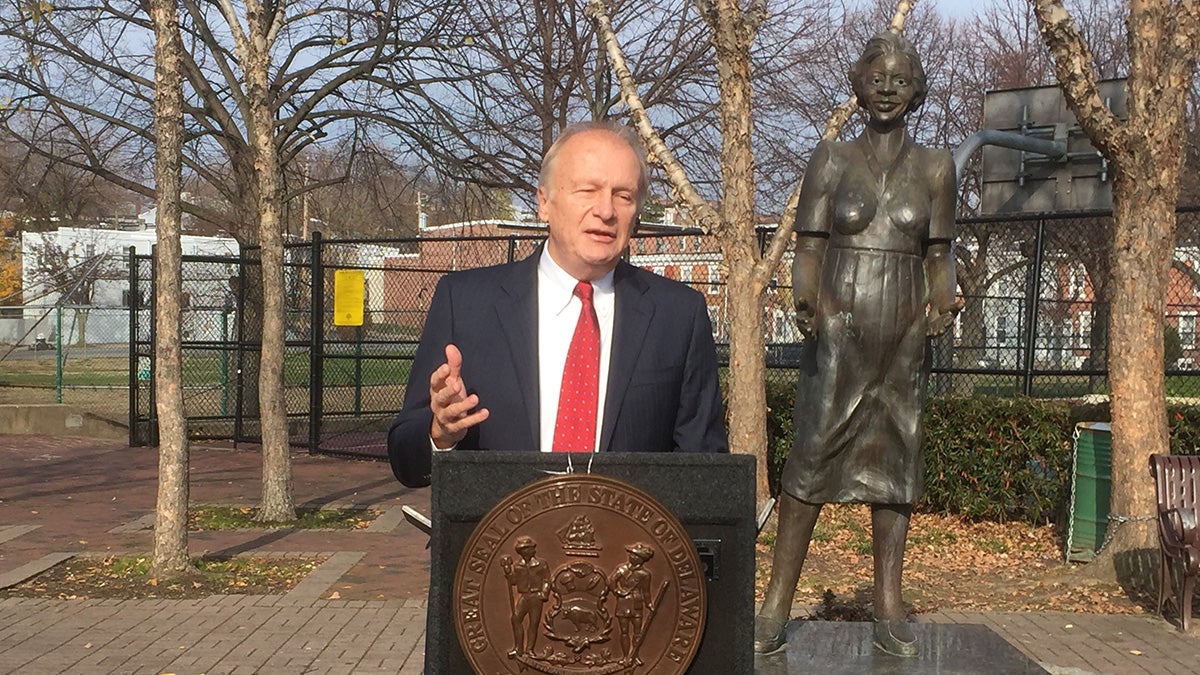Delaware Work-a-Day, Earn-a-Pay program plan released

Sen. Robert Marshall, D-Wilmington (Zoe Read/WHYY)
Sen. Robert Marshall, D-Wilmington, non-profit leaders and members of the community await approval from Gov. Jack Markell, D-Delaware, and lawmakers for a final outline of a program that offers work to individuals who lack opportunities.
On Wednesday, task force members from the Work-a-Day, Earn-a-Pay program introduced findings and recommendations for the $2 million pilot program following two months of public hearings and deliberations.
“I think the public hearings and the commitment by the task force members and the governor’s high level of interest in the program has come a long way in a few months,” Marshall said.
“I’m hoping that after discussions between the governor and members of the task force the governor will commit to the project and help make it work.”
In October, Marshall announced the pilot program aimed at providing at-risk and disadvantaged Delawareans the opportunity to earn a decent living as they work on public works projects, making $10.25 to $15 an hour.
The program, expected to start in May, is a response to Delaware’s economic downturn and unemployment rate, and is modeled on the Depression-era Works Projects Administration, which put millions of Americans to work on public works projects, including the building of Delaware’s Lewes-Rehoboth Canal.
“I think it could improve the quality of life for those who don’t have opportunity now and are unemployed but willing to work; may not have all the high level credentials and skills to find a way into the work environment but could, if they’re given opportunity, to gain confidence and earn a paycheck,” Marshall said.
Eric Stewart of Wilmington was once a convicted felon, and understands firsthand how difficult it can be for an individual to get life back on track after going through a tough situation.
He said he believes the Work-a-Day, Earn-a-Pay program will demonstrate that individuals can turn their life around.
“I see the Work-a-Day, Earn-a-Pay program as a way not to just help myself, but help future generations to prevent them from going to steps I was lead into,” Stewart said.
“There is another way out there as a means to an end, besides standing on the corner, selling drugs, robbing and stealing and doing God knows what else to survive.”
Elder Tyrone Johnson of Churches Take a Corner and New Destiny Fellowship is one of the community leaders invested in the program, which he says can provide hope to individuals struggling to get by.
Johnson said he has a history of addiction, and believes the program could be an important tool for those who need help.
“I can recall getting clean and not being able to work and how unimportant I felt and how unworthy I felt because I couldn’t produce enough anything to amount to anything,” Johnson said.
“When you have a program where a person can honestly work a day and they know they aren’t going to be hoodwinked, they’re going to get paid, it develops character, it develops fortitude and promise and it re-installs hope.”
The proposal, released to the public Wednesday, suggests partnering with non-profits and other companies to find individuals with low-incomes, criminal records or a low level of education, who have the desire to work and earn a living.
The program outlines the types of projects individuals can work on, including fixing up vacant housing, working on a natural gas pipeline and cleaning up rivers, streams and parks through partnerships with the Department of Natural Resources and Environmental Control.
In addition, job skills and training will be offered to participants of the program to ensure that once the project is complete, they will be able to continue to hold a job.
The task force has also identified funding sources from the Strategic Fund operated by the Delaware Economic Development Office, settlement funds from the 2008 financial crisis and through public-private partnerships.
Administration and oversight will be taken on by state and non-profit organizations to ensure the program’s success and accountability for how funds are being spent.
Stewart was one of the community members who attended the meetings to make suggestions to the task force. He said the most important recommendation is the connection between various organizations.
“We can’t just do it on our own,” he said. “We have to have help from everyone to make it a successful program.”
Community advocate Edwina Bell said it’s important to make sure the program has long-term benefits, and she said she believes providing resources like training is a step in the right direction to achieve that.
“Providing a holistic approach to people’s needs is what’s going to give them hope,” she said. “Anybody can earn some money today, but where are you going to go three, four, five, 10 years from now?”
Johnson said he believes the community will be receptive to the program.
“There are lot of good people across Wilmington and across the state of Delaware who don’t want to sell drugs and don’t want to do some of the activities they’re doing,” he said. “But you’re going to need credible people who are not lazy to get up and do some outreach, and once people know the folks standing in front of the program are credible and credential, not necessarily by universities but by God and they have authenticity in what they say, you won’t have to recruit people—they will come.”
WHYY is your source for fact-based, in-depth journalism and information. As a nonprofit organization, we rely on financial support from readers like you. Please give today.





